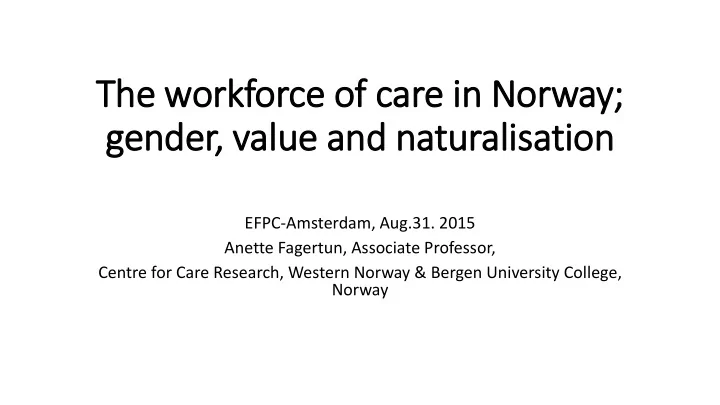

The workforce of care in in Norw rway; gender, valu lue and naturalisation EFPC-Amsterdam, Aug.31. 2015 Anette Fagertun, Associate Professor, Centre for Care Research, Western Norway & Bergen University College, Norway
The health-care sector • large economic sector: labor intensive and a key driver for economic growth in Europe • recruitment and retainment of health care staff: an urgent societal challenge • societal transformation: ‘globalisation’ and neoliberal capitalist ideologies of market liberalisation • New Public Management (NPM): marketization, ‘externalisation’ and commercialisation – of care work and services
Norway: welfare regime & care workforce • Decentralized welfare regime: municipalities provide primary care • H istorically: ‘de -familialized ’, aims to promote gender equality • Care work: low wages, heavy workloads, demanding work hours, difficult work-life balance (income-time) - factors that hinder recruitment and retainment • Low social status, adds to this situation • Informal unpaid care economy vs. formal paid care economy
Feminization of care work • women hold about 90 percent of the full- time equivalents (FTE’s) in the municipal care services (Norwegian Ministry of Health and Care Services 2013:13, 65) • FTE’s grown steadily: 20 000 in 1971, 130 000 in 2011, by 2050 estimated need is 260 000 FTE’s. • Trend, last two decades: reforms & de-institutionalization • high employee turnover, high rate of part-time employment and high sick leave percentage (Jacobsen 2012) • Norway: must double FTE’s in the care sector by 2050
New ideological trends: ‘re -informalization ’ of care work • Policies promoting informal care: indicate increasing state-reliance on the “invisible” unpaid care economy and signal a “re -informalization ” of care work. • Norway: dominant model of wage labour is gendered male • naturalization of care work as an ‘extension’ of women’s work of domesticity: Care work as production of persons, ‘not’ profit for society • gendered divisions of labour: create gender structures which strongly shape women and men’s labour trajectories • the concept of gender as analytical tool: refers also to structures and values tied to male and female qualities which on an abstract level assemblage as a principle of difference in society.
Norway: the workforce of care – > towards ‘re -informalization ’ • Norway: care work in the informal sector by volunteer groups of women ‘ formalised ’ and included in welfare regime 1960’s • Welfare model, decentralised: moved from de-familialization & institutionalization to de-institutionalization and re-familialization • Care work: 90 percent women hold FTE’s in care sector of municipalities feminized, low paid, part-time, high rate of sick leave and employee turnover, low retainment in elderly care and rural areas • New ideological trends: individualization and promoting informal care • Circle of care work: informal formal ’re -informalization ’ • Argument: re-informalization represents a devaluing of care work, serious implications for securing a sustainable workforce and for gender equality
Recommend
More recommend